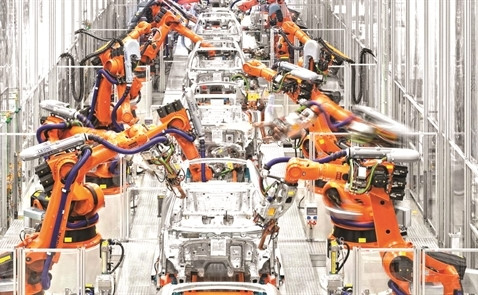Vietnamese workers warned of ‘robot threat’
Millions of textile & garment and footwear workers could be replaced with robots in the future.
 |
Robots are already being used at the 20-hectare Vinamilk actory in Binh Duong province. There are 19 robots and several workers. Everything runs on an automation process. Some robots carry packs to the filling room, while others take finished products to the storehouse.
When robots begin to lose power, they automatically go to the battery charging area, where they install full batteries without the assistance of workers.Nguyen Chien Thang, director of Scan Pacific, an interior product manufacturer, who has received more orders from foreign partners in recent years, has decided to equip his newly built factory with an automated production line, which would help increase productivity by 4-5 times.
Other large furniture companies in Binh Duong have also spent money on automation technology. A representative of Vi Dai, a supplier of machines and equipment, said the company’s sales increased by 50% in 2016 because more wooden furniture manufacturers bought modern equipment to increase productivity and lower costs.
Thanks to the automation production line, which has been running in the last 10 years, Minh Long 1 Porcelain Company has cut the number of workers from 400 to 20. To date, it has imported seven robots with the value of no less than 40,000 euros.
Analysts commented that though it is costly to replace workers with intelligent robots, using robots in production lines is a growing tendency worldwide, including in developing countries like Vietnam.
The World Economic Forum predicted 5 million jobs would be lost by 2020 because of artificial intelligence. The latest report from ILO shows that two-third of 9.2 million workers in the textile & garment and footwear industries in South East Asia are being threatened by robots.
In Vietnam, ILO said 86% of textile & garment workers may lose jobs in the automation process, while three-fourth of workers in the electronics sector will be replaced with robots.
Pham Thi My Le, president of Le & Associates, predicted that 80% of works would be undertaken by robots by 2020.
The popularity of robots would prompt multi-national conglomerates to stop outsourcing to Asian countries and to make products in their home countries with automated production lines. If so, Asian countries, which now rely on doing the outsourcing for foreign companies, would suffer.
Vietnam can attract foreign investments thanks to cheap labor. However, once robots replace large numbers of workers, that advantage will diminish.

